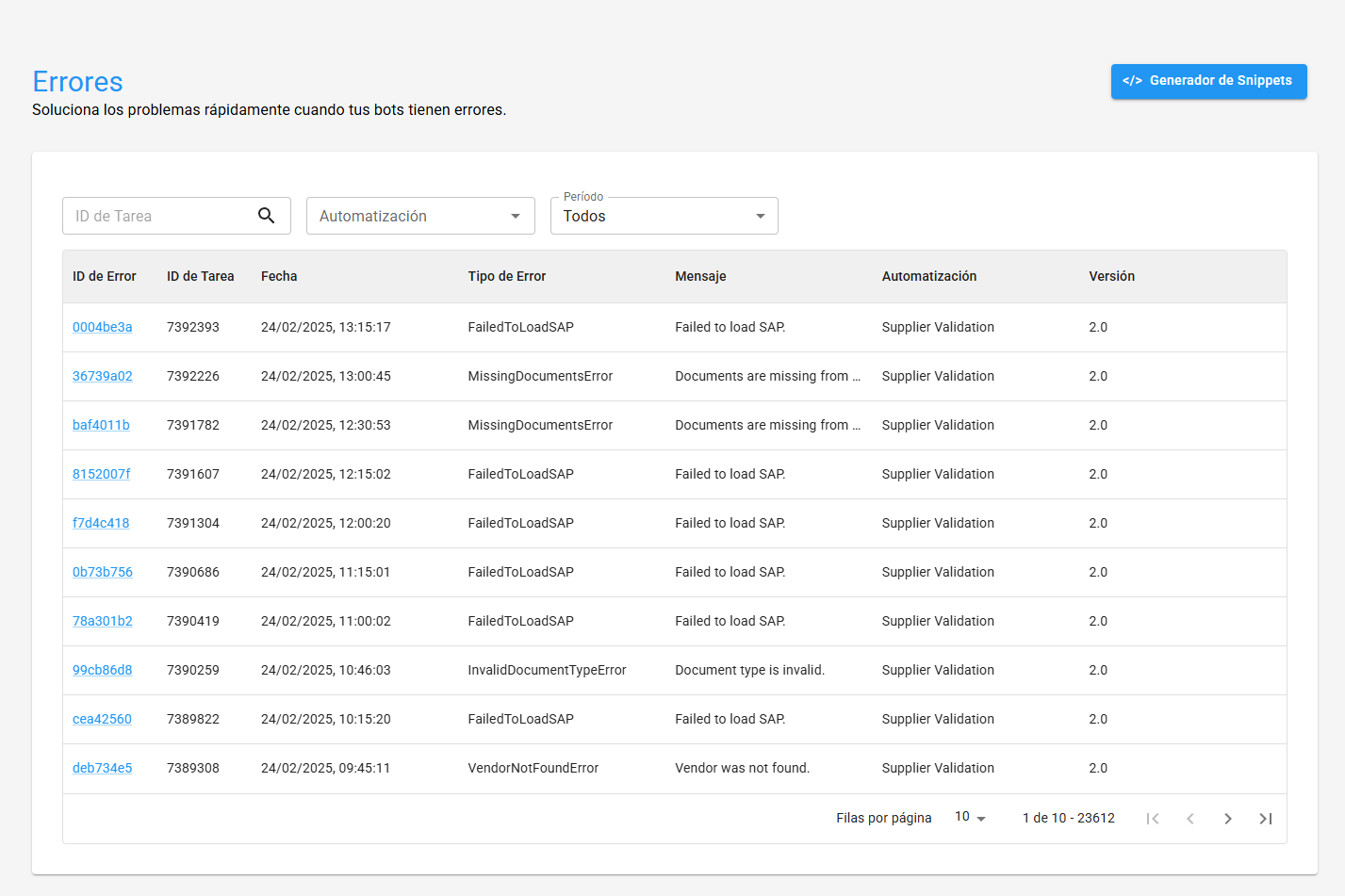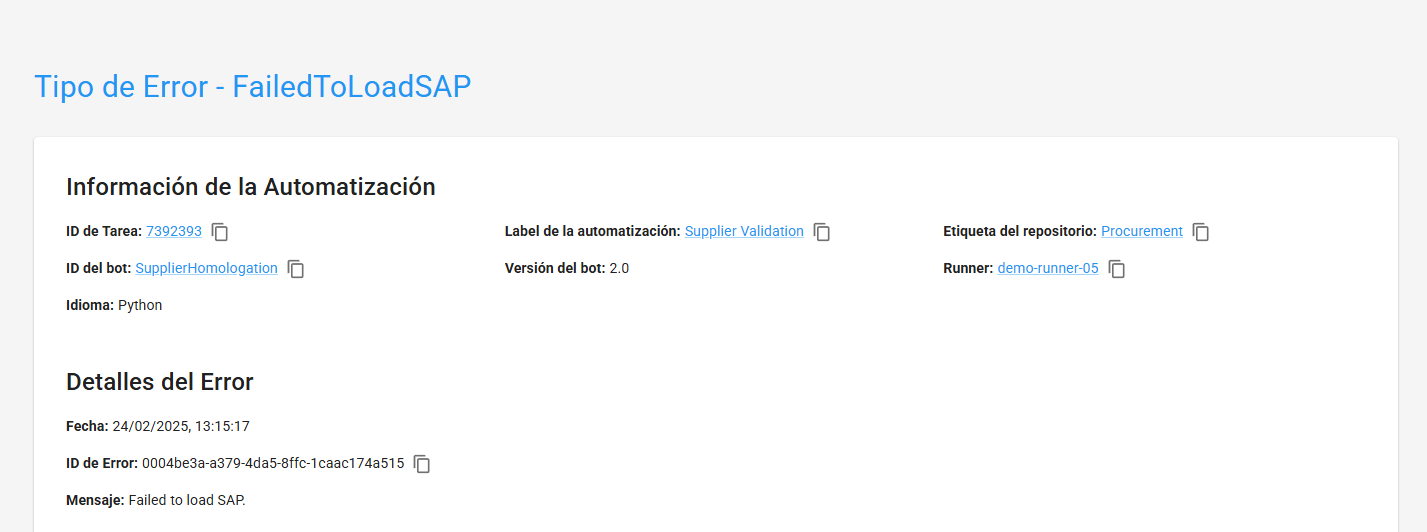Errores
Ir a ErroresLas Alertas son muy útiles, pero a medida que aumentamos la cantidad de automatizaciones, puede volverse muy difícil diagnosticar problemas y verificar qué tareas generaron errores.
Usando la función de Errores, puedes identificar fácilmente las tareas que causaron errores. Puedes filtrarlos por ID de tarea, etiqueta de automatización y período.
Para cada error, puedes hacer clic en el ID del error para ver los detalles de lo ocurrido.
Tip
Explore  para ver ejemplos de código que facilitan el manejo de errores, accede y aprende cómo crear un error simple y cómo crear un error personalizable mediante código.
para ver ejemplos de código que facilitan el manejo de errores, accede y aprende cómo crear un error simple y cómo crear un error personalizable mediante código.
Los fragmentos generados están disponibles en los lenguajes Python, Java, JavaScript y TypeScript.
Detalles al hacer clic en el ID del error:
Detalles del error¶
StackTrace¶
Captura de pantalla¶
Etiquetas¶
Las etiquetas te ayudan a visualizar rápidamente los datos de tiempo de ejecución. Explora las etiquetas estándar o añade etiquetas personalizadas para obtener información más detallada.

Adjuntos¶
Los archivos adjuntos ayudan a replicar el entorno para una rápida resolución de problemas, con la opción de agregar sus propios archivos.

De esta manera, es posible tener un mayor control para gestionar, identificar y corregir errores.
Cómo registrar errores usando el SDK de Maestro¶
Puedes registrar fácilmente errores en la plataforma utilizando el SDK de Maestro en tu código de automatización.
Instalación¶
Si aún no tienes la dependencia instalada, simplemente sigue estas instrucciones:
Important
Además de la instalación, recuerda incluir la dependencia en el archivo requirements.txt del bot.
<repositories>
<repository>
<id>nexus-botcity-public</id>
<url>https://devtools.botcity.dev:8081/repository/botcity-public/</url>
<releases>
<enabled>true</enabled>
</releases>
<snapshots>
<enabled>true</enabled>
</snapshots>
</repository>
</repositories>
<dependencies>
<!-- Your other dependencies -->
<dependency>
<groupId>dev.botcity</groupId>
<artifactId>maestro-sdk</artifactId>
<version>2.0.3</version>
</dependency>
</dependencies>
Importar el SDK¶
Después de la instalación, importa la dependencia e instancia el SDK de Maestro:
# Import for integration with BotCity Maestro SDK
from botcity.maestro import *
# Disable errors if we are not connected to Maestro
BotMaestroSDK.RAISE_NOT_CONNECTED = False
# Instantiating the Maestro SDK
maestro = BotMaestroSDK.from_sys_args()
# Fetching the details of the current task being executed
execution = maestro.get_execution()
// Import for integration with BotCity Maestro SDK
const { BotMaestroSdk } = require('@botcity/botcity-maestro-sdk')
// Getting parameters passed by Runner
const args = process.argv.slice(2)
const [server, taskid, token] = args
// Login with information from the Dev. Environment page
const maestro = new BotMaestroSdk()
maestro.login("YOUR_SERVER_HERE", "YOUR_USER_HERE", "YOUR_KEY_HERE")
// Fetching the details of the current task being executed
const executionTask = await maestro.getTask(taskid)
// Import for integration with BotCity Maestro SDK
import { BotMaestroSdk } from '@botcity/botcity-maestro-sdk'
// Getting parameters passed by Runner
const args = process.argv.slice(2)
const [server, taskid, token] = args
// Login with information from the Dev. Environment page
const maestro: BotMaestroSdk = new BotMaestroSdk()
maestro.login("YOUR_SERVER_HERE", "YOUR_USER_HERE", "YOUR_KEY_HERE")
// Fetching the details of the current task being executed
const executionTask: Task = await maestro.getTask(taskid)
// Import for integration with BotCity Maestro SDK
using Dev.BotCity;
using Dev.BotCity.MaestroSdk.Model.Execution;
// Instantiating the Maestro SDK
BotMaestroSDK maestro = BotMaestroSDK.FromSysArgs();
// Fetching the details of the current task being executed
Execution execution = await maestro.GetExecutionAsync(maestro.GetTaskId());
Registrar un error¶
Código completo¶
from botcity.core import DesktopBot
from botcity.maestro import *
# Disable errors if we are not connected to Maestro
BotMaestroSDK.RAISE_NOT_CONNECTED = False
def main():
maestro = BotMaestroSDK.from_sys_args()
execution = maestro.get_execution()
# Recording error in Maestro
try:
bot = DesktopBot()
# Implement here your logic...
...
# Forcing an error
div = 0 / 0
except Exception as error:
maestro.error(task_id=execution.task_id, exception=error)
def not_found(label):
print(f"Element not found: {label}")
if __name__ == '__main__':
main()
import dev.botcity.framework.bot.DesktopBot;
import dev.botcity.maestro_sdk.BotExecutor;
import dev.botcity.maestro_sdk.BotMaestroSDK;
import dev.botcity.maestro_sdk.runner.BotExecution;
import dev.botcity.maestro_sdk.runner.RunnableAgent;
public class FirstBot extends DesktopBot implements RunnableAgent
{
public FirstBot() {
try {
setResourceClassLoader(this.getClass().getClassLoader());
} catch(Exception e) {
e.printStackTrace();
}
}
@Override
public void action(BotExecution botExecution) {
try {
BotMaestroSDK maestro = new BotMaestroSDK();
maestro.login(botExecution);
// Recording error in Maestro
try {
// Implement here your logic...
...
// Forcing an error
int div = 0/0;
} catch (Exception error) {
maestro.createError(botExecution.getTaskId(), error, null, null, null);
}
} catch(Exception e) {
e.printStackTrace();
}
}
private void notFound(String label) {
System.out.println("Element not found: "+label);
}
public static void main(String[] args) {
BotExecutor.run(new FirstBot(), args);
}
}
const main = async () => {
const { BotMaestroSdk } = require('@botcity/botcity-maestro-sdk')
const args = process.argv.slice(2)
const [server, taskid, token] = args
const maestro = new BotMaestroSdk()
maestro.login("YOUR_SERVER_HERE", "YOUR_USER_HERE", "YOUR_KEY_HERE")
const executionTask = await maestro.getTask(taskid)
// Recording error in Maestro
try {
eval("hoo bar");
} catch (error) {
await maestro.createError(executionTask.id, error)
}
}
main()
const main = async () => {
import { BotMaestroSdk } from '@botcity/botcity-maestro-sdk'
const args = process.argv.slice(2)
const [server, taskid, token] = args
const maestro: BotMaestroSdk = new BotMaestroSdk()
maestro.login("YOUR_SERVER_HERE", "YOUR_USER_HERE", "YOUR_KEY_HERE")
const executionTask: Task = await maestro.getTask(taskid)
// Recording error in Maestro
try {
eval("hoo bar");
} catch (error: any) {
await maestro.createError(executionTask.id, error)
}
}
main()
using Dev.BotCity.MaestroSdk.Model.AutomationTask;
using Dev.BotCity.MaestroSdk.Model.Execution;
using System;
using System.Threading.Tasks;
namespace FirstBot
{
class Program
{
static async Task Main(string[] args)
{
BotMaestroSDK maestro = BotMaestroSDK.FromSysArgs();
Execution execution = await maestro.GetExecutionAsync(maestro.GetTaskId());
Console.WriteLine("Task ID is: " + execution.TaskId);
Console.WriteLine("Task Parameters are: " + string.Join(", ", execution.Parameters));
// Recording error in Maestro
try {
// Implement here your logic...
...
// Forcing an error
throw new Exception("test");
} catch (Exception ex) {
await instance.CreateErrorAsync(ex, execution.TaskId);
}
}
}
}
Tip
Observa las otras operaciones que podemos realizar al registrar errores utilizando el SDK de BotCity Maestro, incluyendo capturas de pantalla, etiquetas y adjuntos al informar el error.



